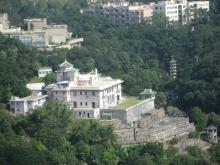10 Mar 1944, Chronology of Events Related to Stanley Civilian Internment Camp
Primary tabs
The British paper the Catholic Herald publishes an article based on an interview with Mrs. Lancelot Forster, wife of the head of Stanley's Educational programme, Professor Lancelot Forster.
Mrs. Forster tells a staff reporter that she received a letter from her husband in January. It was written in September 1943 and this represented 'a much quicker delivery than usual and very probably it came on one of the (Canadian) exchange ships'.
The main problem in the camp has always been the poor diet compounded by the Japanese refusal to allow Red Cross parcels:
Strangely enough, this scanty diet is quite in keeping with international law, which says that the prisoners shall have no less than their guards. But Japanese are able to exist on a sparse diet of rice, a little fish and vegetables - which is not enough for the European frame. All kinds of deficiency diseases have resulted, including intermittent blindness in which the eye registers a blank and sometimes sees objects far removed from their actual location.
Mrs. Forster pays tribute to members of 'the fortunate section of Hong Kong population that has escaped internment' some of whom have helped supplement rations:
(The Italian) priests did wonderful work, I know, and so did the Catholic Irish missionaries.
Mrs Forster goes on to speak about the educational programme, under the leadership of her husband, and presents a picture of the varied activities allowed in camp (including bathing, walking and discussion groups) but ends by stressing the prisoners are haunted by the 'worrying' knowledge that there is not enough to eat and calling on the Japanese to allow the Red Cross to alleviate the situation.

